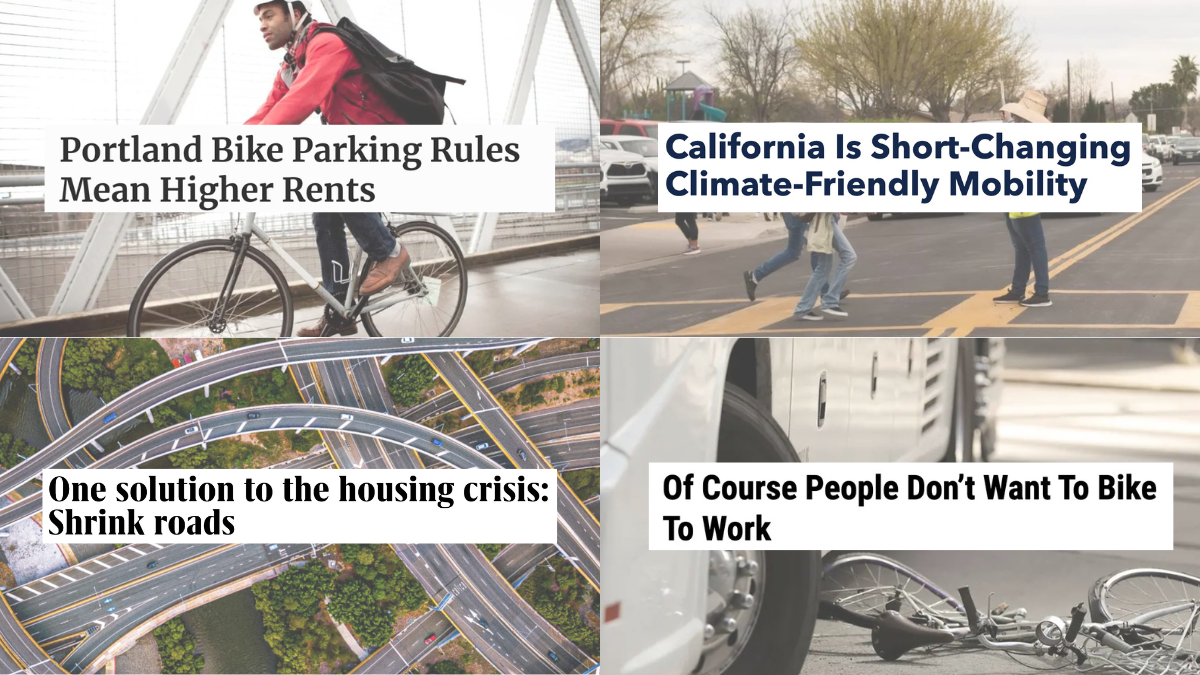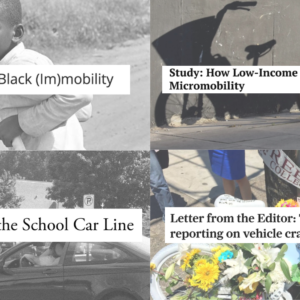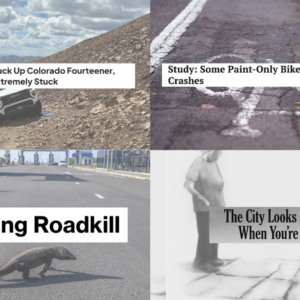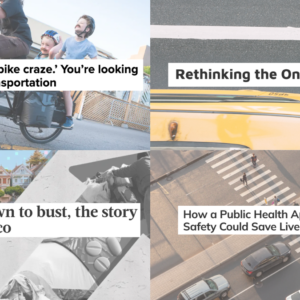Welcome to the week! Let’s make it a good one.
Here are the best stories from the past seven days you should know about, from sources you can trust…
Oh, Wisconsin: Lawmakers in Wisconsin are so afraid of seeing people ride bikes naked they want to pass a law that would make it illegal. I wonder if they realize how this protesting thing works: I guarantee if this law passes, Madison will have the largest naked bike ride in the world the following year. (Men’s Journal)
Goodbye Cross-Check: One of the most ubiquitous bikes in Portland, the Surly Cross-Check, has been discontinued by its manufacturer after a quarter-century run as a stalwart, beloved, do-anything rig. (Velo News)
Noise pollution is a thing: I live right next to a freeway on-ramp and have become radicalized to the idea that people should be punished for loud engine revving. A neighborhood in Manhattan has installed a device that issues sound citations. (Guardian)
You get what you spend for: An analysis of spending by California’s DOT found that less than 20% of its investments were aligned with their own climate and transportation goals. Would love to see someone do a similar analysis for Oregon. (NRDC)
Shrink roads, build housing: Last week we shared the Urban Trails Network concept that would use existing road space to create active transportation infrastructure. And now this: There are efforts afoot to reclaim roads to build housing. (Fast Company)
Want a huge truck or SUV? Pay for it!: Be still my beating heart… The Colorado legislature is considering a bill that would charge people an extra fee for cars and trucks over a certain weight. It’s one of the first efforts to address car bloat or “autobesity” and I hope Oregon lawmakers take note. (Colorado Public Radio)
Singapore isn’t messing around: On a related note to the above item, it now costs at least $76,000 for a 10-year “certificate of entitlement” — a requirement if you want to drive a car in Singapore (although I fear that in the U.S. if we did that some rich folks would pay for it and then drive like even bigger assholes as they flash their certificate around like a badge). (CNN)
DOT whistleblower: Now this is how you work the inside game. An ex-advocate worked their way up into Caltrans (California’s DOT) and spoke truth about their freeway expansion plans, only to get demoted for speaking against the party line. (Politico)
Affordable housing and bike parking: A former member of Portland’s Bicycle Advisory Committee says the city’s overly-prescriptive bike parking rules for housing developers reduce overall unit production and push up rent prices. (Forbes)
Biking down? Of course it is: If you are a regular bike rider in any major American city, the bad biking stats of late will come as no surprise. And the response should be to improve infrastructure, not give up on cycling. (Jalopnik)
15-minute cities: Creating more neighborhoods where people can live, work, play and shop in close proximity is essential for the survival of the human species on planet earth — so people who think it’s a conspiracy theory should not be taken seriously. But I digress. This is a good summary of the 15-minute city concept and the absurd pushback it tends to receive. (NPR)
Cycling and downtown revitalization: Good to see that bicycling advocates are a big part of the conversation around how best to revitalize an important street in downtown San Francisco. Take note Commissioner Mapps! (ABC SF)
Thanks to everyone who shared links this week!








Thanks for reading.
BikePortland has served this community with independent community journalism since 2005. We rely on subscriptions from readers like you to survive. Your financial support is vital in keeping this valuable resource alive and well.
Please subscribe today to strengthen and expand our work.
Boulder Colorado used to have a naked bike ride, but the city wanted to crack down on it so much that the threatened anyone that rode in it would be charged as a sex offender. That effectively killed the naked bike ride in that city.
My response is to keep on riding. My cycling experience is as good as it has ever been, and the things continue to improve. There are still a few of us bike-forward optimists around.
I like Colorado’s idea of charging owners of heavy vehicles for safety infrastructure, but the proposed fee structure is nowhere near high enough to actually discourage the purchase of giant vehicles. The fee would top out at less than $30. Considering that the heaviest vehicles cost well north of $100k, the fee would barely be noticable.
This take on nudity was always weird to me. Seeing a naked body is assault and something you have to protect children from? Whenever I see kids along the route they are never even phased by the riders. You’re not born affronted by nudity it’s something you’re taught usually by people like this lawmaker.
Oh no! it’s a breast! I’m scarred for life! Ack – a flaccid penis, OMG that’s so horrifying!
That guy just killed 10 people in a hyper-violent fight sequence – meh, no big deal.
Wow, how messed up are we?
American culture/religion teaches people to be deeply ashamed of their bodies. Because they folks like Weigand are ashamed of themselves, they can only imagine a naked body in a sexual context because that’s the only time they themselves feel comfortable being naked.
If seeing a naked person in a non-sexual context actually takes away the child’s “innocence”, it’s because that parent has failed their child miserably.
You should always consider the motivations of the Wisconsin state legislature through the lens of “how can we posture ourselves to be hurting the libs in Madison and Milwaukee?” because that’s more or less how they’ve operated since around 2010 when the extremely gerrymandered maps went into place (2020 maps weren’t much help either tbh). Wisconsin has a fairly even Democrat-Republican split, but the Republicans maintain a near 2/3 supermajority in the assembly because of those maps. The 2022 Assembly election saw the Republicans get 64/99 seats on just 53% of the vote (while Democratic Governor Evers won by 3 points). In 2018, the Dems got 53% of the vote while winning 36/99 seats. It sucks! I hate it!
This is all to say that if you all hate Oregon politics just be happy you don’t live in Wisconsin. Extremely frustrating place to be from and care deeply about!
I rode in the WNBR once, and I was struck by the reactions of kids along the ride- they were nonplussed by the nudity, but very excited to see balloons, streamers, body paint. etc. Its a non-issue, IMO
“(although I fear that in the U.S. if we did that some rich folks would pay for it and then drive like even bigger assholes as they flash their certificate around like a badge). ”
I have frankly never noticed that only “rich people drive like assholes”.
I have been hit and had a lot of near misses with old beat up cars that low income people own and drive.
What a strange thing to say, what exactly was your point?
There have been multiple studies proving this. Don’t be banal.
20% of all car accidents and deaths are in the 20-34 age group.
‘You know, the people with all the money and wealth…
I would rather be Banal than just plain ignorant…
I don’t know about the research referenced by Jolly Dodger, but it seems to me like people in the 20-34 age group are probably driving a car they got from their parents.
Jolly Dodger just did the usual internet thing by posting a link to some stupid google search that had nothing to do with real statistics as far as who drivers are and who gets in accidents.
It is overwhelming younger people which was my point. It has Nothing to do with income.
Jolly just thought he could “own” me with his stupid google search.
Just like the J. Maus comment about rich people which had Nothing to do with the story.
Just a lame attempt to act like a social warrior.
Does anyone really think you are less safe on a bicycle or car in Lake Oswego than East Portland because that is not the fact.
I reckon you’re right about the dangerousness of younger drivers, if for no other reason than insurance carriers charge much more to insure them. And the central function of the latters’ whole business is supposed to be rationally estimating risk premiums and underwriting appropriate policies to match them.
Still, though, the anecdotal evidence associated with various notorious “affluenza” cases supports the hypothesis that, in this society at least, *youth* COMBINED with *wealth* may very well be a potentially especially lethal combination.
Most anything can be supported by “anecdotal evidence” which means it is useless in making a point. We all have our own experiences, but they should not be used to support a point about society as a whole.
RE: Singapore “certificate of entitlement”
Seriously? Talk about apples and oranges. Singapore is a city-state of 5.6 million people condensed into only 280 square miles. It has the 2nd highest density of any country in the world. The USA is 185th in density by comparison. Even if you tried to do this in some authoritarian manner in larger US cities it would be a miserable failure.
Singapore is a city, and should be compared to other cities rather than countries. With a population density of ~20k/sq mile, it’s a bit less dense than New York City (22k/sq mile) but a bit more dense than San Francisco (17k/sq mile). I don’t see how the prevailing population density of the US should factor in to how much cities charge for vehicle registrations. Good policy would maintain affordable vehicle ownership and registration in rural areas, while making it more expensive in cities since cities already have alternative means of transportation that at least sniff sustainable financing structures (or did pre-Covid anyways).
You do realize that Singapore is one of the world’s most expensive countries/cities? (It’s even cited in the CNN article) For all those on BP who cry out about inequity & social justice implementing this Singapore policy in Portland would do the exact opposite. You’d simply force the poor and middle class to relocate to the suburbs or elsewhere. But maybe that’s what many desire for Portland, a utopian climate friendly playground for the entitled & wealthy.
https://www.bloomberg.com/news/articles/2020-07-08/behind-the-design-of-singapore-s-low-cost-housing
Singapore builds a lot of subsidized, affordable housing, and it uses an ownership model to allow residents to reap the rewards of the market value of their housing.
It’s an expensive city, but the government takes care of its people in ways that put American cities to shame.
Apparently you failed to read the linked CNN article before posting how great Singapore’s government policies are working?
“Locals say living in Singapore, already ranked the world’s most costly city, has gotten extraordinarily expensive in recent years amid persistent inflation, rising costs of public housing and a slowing economy.”
I don’t think it’s the high car ownership fees that are causing problems in Singapore. Very few people own cars there, and it is extremely well served by public transit.
And newsflash, the Singaporean poverty rate is about the same in as it is in the United States (about one in ten).
They’ve seen inflation in housing and food prices? Really? So has the rest of the world. That CNN article doesn’t give any context for how things have changed over time in Singapore or how their economic conditions are doing relative to the rest of the world. But if they are experiencing higher inflation than other places, it might be due to the fact that almost everything in Singapore is imported, especially food. If they had cheap car ownership, that wouldn’t fix anything.
Big, dense cities are expensive. That’s true the world over. But they are also massive economic machines that produce vast wealth. If the wealth is distributed equitably, the high cost of living isn’t a huge problem.
What are you even talking about? I’m not advocating for Singaporean fees in Portland, just that Singapore is a place that is roughly comparable to New York City in population density. Maybe NYC should have a similar approach to vehicular tax and use as Singapore. It’s transit-rich and walkable already and there aren’t a lot of places in the city/region that you can’t reasonably take transit in to the city rather than drive.
In Portland, a draconian fee on car registration/use would probably have lots of negative consequences but there are still plenty of things that the city/state can and should do to better provide alternatives to driving. Spending state gas tax money on transit is one, and an increased fee on parking and mildly higher registration and gas tax (like 10% to 20% increases) used to pay for better cycling, walking, and transit.
This is unconstitutional here; but more importantly, the gas tax is going away, so it is not a reliable funding source.
Right, good thing we construct our governments to have amendable constitutions. How about framing it as “user fees collected from drivers” rather than gas taxes then, and earmarking funds from that to pay for transit, biking, walking, etc.
This isn’t really a discussion of what is currently legal or not – more of what policy should be
You’ve got to weigh the effort and practicality/political difficulty of changing the constitution vs. the decreasing nature of the gas tax.
My conclusion: not worth it. And if that’s the case, why talk about it as if it were a real option?
A politician may have to weigh how practical it is, but I’m not a politician. It’s not good that Oregon does not allow state gas tax money to be spent on anything other than roads (which really means highways), so I would lobby/campaign/advocate for remedying that. Or at a minimum, when the time comes to replace the gas tax with a different vehicle user fee to not hamstring statewide transportation policy with measures that prevent funds from being spent where they are most needed.
Because it’s a constitutional amendment, any change would have to be voted on by the electorate, and would need a supermajority to pass.
Do you really think we could get 60% of Oregonians to support using vehicle/driving taxes/fees as a general revenue raising mechanism?
My conclusion: There is zero possibility of using gas taxes to pay for transit. Maybe that “should be” the policy, but it can’t happen so let’s move on to other ideas.
This is one of the most common (and one of the silliest) arguments that people often state to reject ideas about limiting car use: The US is just too big! It won’t work in the US because it’s not Germany… or something. Except, remember we’re comparing a city to– another city. Because people don’t often bike across the US. People bike most often short distances within cities and towns.
Interesting argument. Of course, the mere physical dimensions of a country are irrelevant, given that there are even larger countries (Russia) that are not as extremely autodependent. But probably the most relevant factors are historical materialist ones, ie, the origins of the US as a settler colonialist empire that violently displaced the original inhabitants of an entire continent in a few short generations, coinciding with an era of breakneck industrialization, a rare combination of sweeping transformations with only a very small handful of comparable counterparts (Australia comes to mind) in all human history.
Surely Russia also fits the mold as a settler colonialist empire that violently displaced the original inhabitants of an entire (subset) of a continent in a few short generations too (though the colonization of Siberia took a bit longer if memory serves). US automotive culture is linked to US settler colonialism in the sense that they both exist here, but if settler colonialism and auto-dependency were inextricably linked, then Australia, Canada and Russia would exhibit similar levels of dependency.
It played out over a much longer period, was much less thorough, and faced many more daunting obstacles (not the least of which being thorough defeat at the hands of a rival military power, Japan, that was far more advanced, formidable, and implacable at the time than anything the American empire ever faced during its own colonization of a continental territory).
For many reasons, Russia never had the capacity to thoroughly crush the numerous native peoples scattered across its vast Siberian hinterlands. And apparently, neither did it enjoy the “luck” of having any biological “silver bullet” weapons at its disposal, to kill most of them off, either, the way the Americans did with smallpox.
Only a campist would implicitly argue that Russia does not have a long and genocidal imperialist history. Instead of painting pretty lipstick on an imperialist monster, a better approach would be to have the moral courage to admit that the USA is not the only genocidal settler-colonial nation and that it’s OK to hate them all.
I never said anything of the sort (nor did I issue any comparative NORMATIVE judgments at all), but merely pointed out that the Russian “genocidal monster” was far less capable and efficient — and above all, less lucky, on account of innumerable, contingent vagaries of history — than the North American one happened to turn out to be.
By the way, I have no idea which “camp” you’re trying to ascribe to me, but you seem to be pretty confused yourself by the current, historically incoherent propaganda emanating from the Euro-American side, given that Lenin and the Bolsheviks were the sworn enemies of “Great Russian” chauvinism and its Tsarist “prisonhouse of nations” (they coined that term long before anti-Soviet propagandists revived it!) Whereas it’s the rightwing reactionary, Putin, who’s trying to resuscitate and defend their honor, that the Bolsheviks thoroughly tore apart long ago, much to Putin’s chagrin!
General random thoughts:
Naked Bike Ride – I just don’t get the parading around in public sans clothes. Not my thing. But… so long as it’s just nudity and no one feels uncomfortable on the ride, whatever. That being said, dropping a freshy fried Wisconsin cheese curd into your lap on such occasion would be very interesting.
Surly Crosscheck – Good riddance. Not a fan of Surly bikes in general, but the Crosscheck had been surpassed within Surly’s own lineup some years ago. Outside of Surly, State and All-City have produced as good, if not better frames/bikes. Heck, the Cotic Escapade I just pre-ordered as a rolling chassis is only slightly more expensive than a similar Surly frameset. And that Cotic will be built by Scottish steel wizards and have to take a boat to my house vs. going to the bike shop and picking up a frame.
Bike Parking – Others have pointed out some of the issues with Portland’s bike parking ordinance. The 1.1 spots per a space and parking for cargo bikes seems to be the low hanging fruit here. Another option would be to ditch horizontal parking as shown/described in the ordinance. I have vertical parking in my garage and it works perfectly fine. If you are fit enough pedal, you are fit enough get your bike on its back wheel and put in a cradle. Steadyracks are pretty cheap.
The article about required Bike Parking creating a condition for a future housing shortage should be taken with a big grain of salt. The FREOPP (Foundation for Research on Equal Opportunity) think tank that paid to have this article written is overseen by a board of directors from large financial interests from the center right: like Capital Counsel Management LLC, Bain Capital, Bitcoin firms, PR firms, ex-Republican presidential staff, Silicon Valley, Advent International etc. I cannot see where FREOPPs money comes from in their older 990s but I doubt its in $10s and $20s from small near poverty donors seeking marketplace solutions.
I read this and had a spontaneous orgasm.
Why shrink roads to build housing? How about converting every golf course in the city into something useful? Only a tiny fraction of the population (mostly rich white men) ever sets foot on a golf course, and all that wasted water could surely be used for something better.